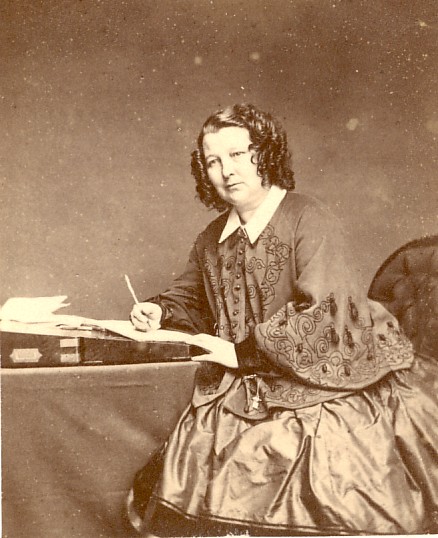

Queer Places:
Ingress Abbey, Greenhithe DA9 9GQ, Regno Unito
 Eliza
Cook (24 December 1818 – 23 September 1889) was an English author and poet
associated with the Chartist movement. She was a proponent of political
freedom for women, and believed in the ideology of self-improvement through
education, something she called "levelling up." This made her hugely popular
with the working class public in both England and America. She was a close friend and lover of the American actress
Charlotte Cushman,
to whom Cook wrote love poems.[5][6][7]
In the 1840s Cook published a fervent poem, “To Charlotte Cushman,” which
described the two women as “captive in Affection’s thrall."
Eliza
Cook (24 December 1818 – 23 September 1889) was an English author and poet
associated with the Chartist movement. She was a proponent of political
freedom for women, and believed in the ideology of self-improvement through
education, something she called "levelling up." This made her hugely popular
with the working class public in both England and America. She was a close friend and lover of the American actress
Charlotte Cushman,
to whom Cook wrote love poems.[5][6][7]
In the 1840s Cook published a fervent poem, “To Charlotte Cushman,” which
described the two women as “captive in Affection’s thrall."
Eliza Cook was the youngest of the eleven children of a brazier (a brass-worker) living in London Road, Southwark, where she was born. When she was about nine years old her father retired from business, and the family went to live at a small farm in St. Leonard's Forest, near Horsham. Her mother encouraged Eliza's fondness for imaginative literature, but the child was almost entirely self-educated. She began to write verses before she was fifteen ; indeed, some of her most popular poems, such as 'I'm afloat' and the 'Star of Glengarry,' were composed in her girlhood. [1]
Her first volume, Lays of a Wild Harp, appeared in 1835, when she was only seventeen. Encouraged by its favourable reception, she began to send verses anonymously to the Weekly Dispatch, the Metropolitan Magazine, the New Monthly Magazine, and The Literary Gazette;[1] William Jerdan sang her praises in the last of these. After a time she confined herself to the radical Weekly Dispatch, where her first contribution had appeared under the signature 'C.' on 27 Nov 1836,[1] and she became a staple of its pages for the next ten years. Its editor was William Johnson Fox and its owner was James Harmer, a London alderman.[2] She lived for a time at Harmer's residence, Ingress Abbey, in Greenhithe, Kent,[3] and wrote certain of her works there.[4]
Her poem The Old Armchair (1838) made hers a household name for a generation, both in England and the United States. In that year, she published Melaia and other Poems.
Her work for the Dispatch and New Monthly was pirated by George Julian Harney, the Chartist, for the Northern Star. Familiar with the London Chartist movement in its various sects, she followed many of the older radicals in disagreeing with the O'Brienites and O'Connorites in their disregard for the repeal of the Corn Laws. She also preferred the older Radicals' path of Friendly Societies and self-education. From 1849 to 1854 she wrote, edited, and published Eliza Cook's Journal, a weekly periodical she described as one of "utility and amusement." Cook also published Jottings from my Journal (1860), and New Echoes (1864). Her works became a staple of anthologies throughout the century.
Cook was a proponent of political and sexual freedom for women, and believed in the ideology of self-improvement through education, something she called "levelling up." This made her a great favourite with the working-class public.
In 1863 she was given a Civil List pension income of £100 a year.[8]
She died in Wimbledon.[8]
My published books: